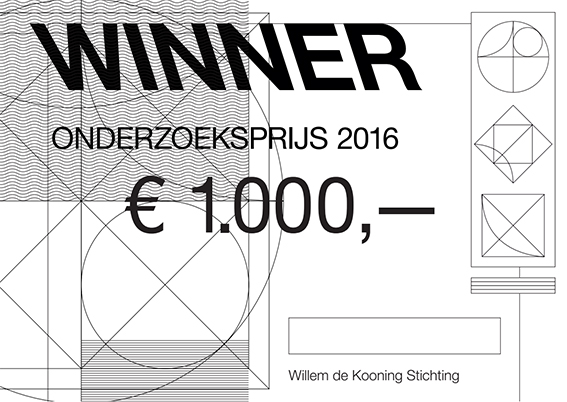In 2016, the WdKA Research Prize was extended to not only include outstanding bachelor projects, but also exceptional work from the Master programmes. Moving away from the convention of research being solely conducted through writing a thesis, this award honours the research of artists, designers, and educators in its entirety. Research, in this context, is understood to encompass a broad scope of methodologies and a range of forms, such as visual work, installations, sonic and haptic pieces, campaigns, networking, writing, and performance. It also includes a breadth of possible orientations across autonomous, social and commercial creative practices.
This year the jury based its decision on the preliminary criteria of originality, criticality, links between theory and practice, accuracy, clarity, crafts, storytelling and context awareness in the nominated projects. Carefully reviewing all of the nominees research, the jury decided to split the award between two projects which, seen next to each other, exemplify the diversity of artistic research and its potential. They are also excellent examples of autonomous and social artistic research practices respectively.
Tracy Hanna (Master Fine Art)
“Can’t quite come to terms with perms” and a reflective text “Tingling”

“Tracy Hanna’s body of research consists of an installation, “Can’t quite come to terms with perms”, and a reflective and explorative text entitled “Tingling”. The installation combines crafted ceramic sculptures, video, pigment, with found elements, such as a fire extinguisher or a light switch, to create a lyrical grammar between various figurative elements and the space itself. Much like the installation a similar approach has been taken in her writing. Hanna, who graduated from the Master of Fine Art programme, continues her research into the sensual and visceral by reusing other artists’ writing, both in style and content, and turning her thesis into an artwork. It is a piece whose self-reflexiveness can be deceptive because the writing might be drawn from another source. Parasitic and appropriative writing has a long tradition in modern and contemporary art (from the Dadaists to Kathy Acker’s postmodernism to Kenneth Goldsmith’s contemporary Uncreative Writing), which the thesis acknowledges through its bibliography. As a whole, the jury found this a compelling, coherent, well-executed work of artistic research. The installation and writing were complementary, both sharing commonalities in content and approach, and at the same time showing a strong sensitivity to what each medium makes possible.”
Mascha van Zijverden (Master Education in Arts)
“Recrafting Craft: A Synergy of Crafts within Fashion Design Education at Art Schools in the Netherlands”

Mascha van Zijverden “Recrafting Craft”, Photo: Waag Society
“Mascha van Zijverden’s research on “Recrafting Craft: A Synergy of Crafts within Fashion Design Education at Art Schools in the Netherlands”, a graduation project in the Master Education in Arts, had proven its value for the professional field even before the jury reviewed it. Van Zijverden characterizes the contemporary fashion system as “broken” because of unmet challenges in social innovation, sustainability and digital manufacturing. This analysis is widely shared in the field, supported through findings of major Dutch fashion researchers and further backed up by van Zijverden’s excellent field research on the Dutch and British fashion systems. In her project, Mascha Van Zijverden’s networked key players of the fashion system. In a series of workshops with fellow educationalists and students, visions of the “future fashion professional” and “craft as fundament for change” were collectively developed. The jury found Mascha van Zijverden’s project extensive in its scope and careful in its execution. As a classical piece of practice-oriented research, it found its validation in the professional field for which it was made.”

